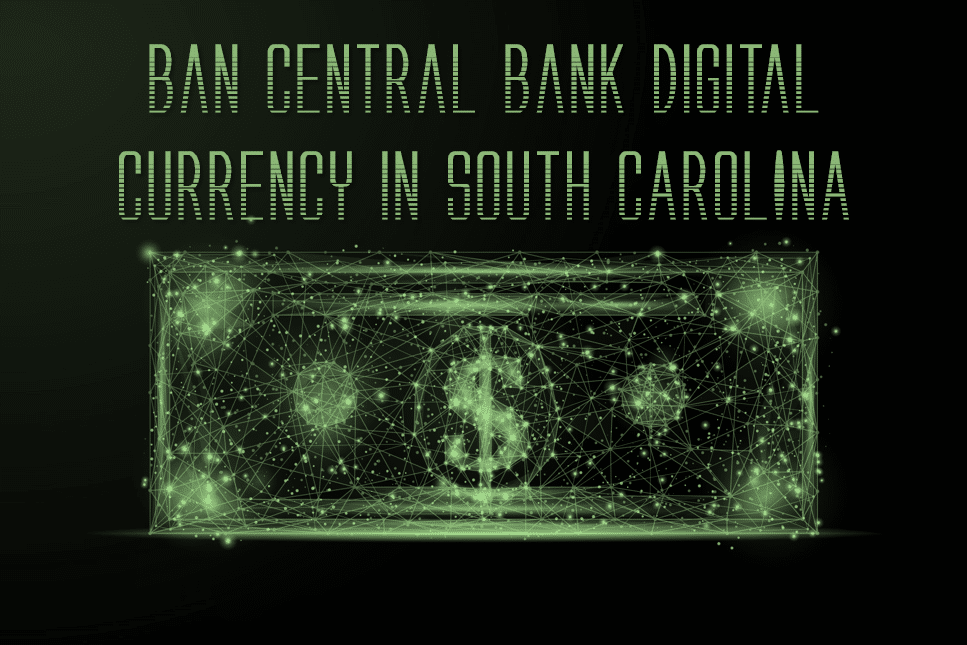Alert Summary
Members of the South Carolina General Assembly are seeking to enact H.4373, H.4442, S.834, and S.861, which would ban Central Bank Digital Currencies (CBDCs) in the state.
Take Action NowContact your Representative
Please help pass H.4373, H.4442, S.834, and S.861 by contacting your state legislators. Inform them of the threat that a digital currency poses to our liberty and privacy, and also inform them of the Constitution's provisions related to monetary policy and the dangers of the Federal Reserve.
Clicking this button will take you to a page where you can send a pre-written letter, call your officials, and/or send video messages.

Members of the South Carolina General Assembly are seeking to enact legislation banning Central Bank Digital Currencies (CBDCs) in the state.
House Bill 4373 (H.4373) is sponsored by Representative Kathy Landing (R-Mount Pleasant) and 20 other representatives. Meanwhile, House Bill 4442 (H.4442) is sponsored by Representative Bill Taylor (R-Aiken), Senate Bill 834 (S.834) is sponsored by Senator Tom Corbin (R-Travelers Rest) and two other senators, and Senate Bill 861 (S.861) is sponsored by Senator Shane Martin (R-Spartanburg).
If enacted, H.4373, H.4442, S.834, and S.861 would amend the state’s definition of money, found in the South Carolina’s Uniform Commercial Code, to exclude CBDCs — regardless of whether they are “issued by the United States Federal Reserve System, a federal agency, a foreign government, a foreign central bank, or a foreign reserve system.” The bill would also ban banking corporations from engaging in transactions involving CBDCs. This would effectively ban them within South Carolina.
H.4373, H.4442, S.834, and S.861 come as state legislatures consider legislation pushed by the Uniform Law Commission (ULC) that would pave the way for a CBDC by banning free-market cryptocurrencies.
Dangers of a Central Bank Digital Currency
A digital currency is a major and imminent threat to Americans’ liberty and privacy — and the Federal Reserve, White House, and Treasury Department are already taking steps to implement one in the United States.
A CBDC would amount to a major expansion of government power, allowing it to restrict our personal freedoms and implement its leftist agenda with no opposition. A digital currency would be centrally controlled by the Federal Reserve, allowing it to oversee all our transactions and thus obliterating privacy and anonymity.
Additionally, the Federal Reserve would be able to set the rules for a digital currency — it could prevent Americans from using it for transactions that the Fed’s leaders and other globalist elites dislike.
Not so long ago, we saw the Canadian government shut down the bank accounts of pro-freedom demonstrators, and Big Tech companies prevent electronic payments in Russia. If a digital currency is implemented, these displays of draconian government power against its political opponents, or those with “unacceptable views,” will intensify exponentially.
If a digital currency is implemented, it would be on a global level rather than just a national level. For example, as of March 2022, nine countries have already implemented digital currencies while 78 others are considering it. Furthermore, at the 2022 World Government Summit, globalist “experts” called for the creation of a global digital financial system.
Last, but not least, the Deep State has been planning a digital currency for many years due to the control over people that it would gain. In fact, a digital currency is a crucial component of the Great Reset plan to control humanity. Covid-19 provided an excuse for it to accelerate those plans.
Ultimately, South Carolina must fully restore sound money within its borders — including nullifying the Federal Reserve, recognizing gold and silver as legal tender, and creating a state bullion depository — in pursuance with Article I, Section 10 of the U.S. Constitution. However, stopping a CBDC is an important step toward preventing totalitarian control over all Americans. Accordingly, urge your state representative and senator to support H.4373, H.4442, S.834, and S.861.
Although we provide a way to easily email legislators, we know from long experience that it takes a lot more interaction with your legislators to get your point across than that provided by emails alone.
That's why we provide an easy way not only to email them, but to contact them by phone, tweet, and even video message them.
